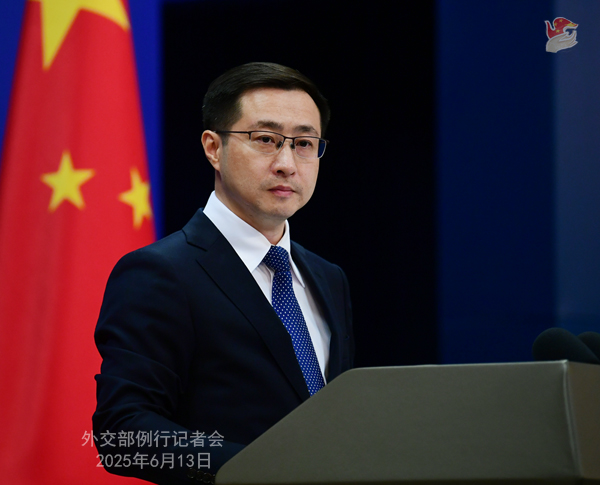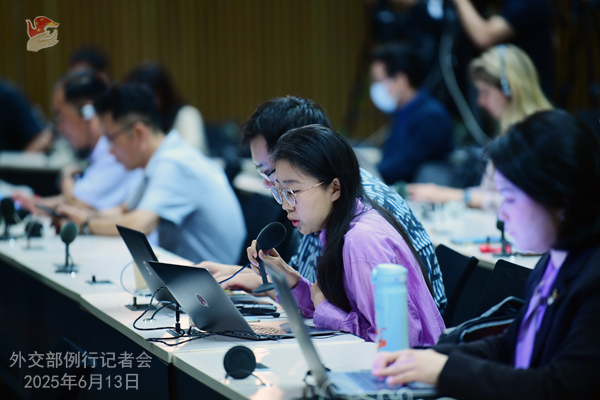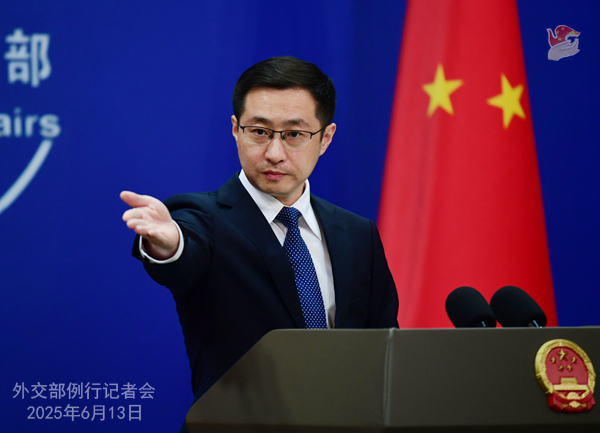
At the invitation of Premier of the State Council Li Qiang, Prime Minister of New Zealand Christopher Luxon will pay an official visit to China from June 17 to 20.
Al Jazeera: Israel today launched early morning attacks against targets in Iran. What’s China’s comment?
Lin Jian: China is closely following Israel’s attacks on Iran and is deeply concerned about the potential grave consequences of the operations. China opposes actions that violate Iran’s sovereignty, security and territorial integrity, and opposes moves that escalate tensions and enlarge conflicts. The abrupt heating up of the region serves no one’s interests. China calls on relevant parties to choose the course of action that is conducive to the region’s peace and stability, and avoid further escalation of the tensions. China stands ready to play a constructive role in helping ease the situation.
Xinhua News Agency: China announced that President Xi Jinping will attend the second China-Central Asia Summit. Could you share with us the arrangement and China’s expectation?
Lin Jian: Establishing the China-Central Asia mechanism was a unanimous decision among China and the five Central Asian countries, which dovetails with the region’s common desire to maintain stability and pursue high-quality development. In May 2023, President Xi Jinping successfully chaired the first China-Central Asia Summit in Xi’an. Since then, China’s relations with Central Asian countries have entered a new era. Our cooperation has been deepened and solidified, which keeps injecting fresh impetus into regional development and delivering tangibly for the peoples of all six countries.
It is the first time that the China-Central Asia Summit will be held in a Central Asian country. President Xi Jinping will attend the summit and deliver a keynote speech. Together with leaders of the participating Central Asian countries, they will exchange views on the achievements of the China-Central Asia mechanism, mutually beneficial cooperation under the framework, and international and regional hotspot issues, and jointly attend relevant events. During the summit, President Xi will also meet with these leaders and lay out the top-level plan for China’s relations with five Central Asian countries.
We believe through this summit, China and five Central Asian countries will further consolidate the foundation of mutual trust, build consensus for cooperation, deepen the synergy between strategies, upgrade cooperation in various fields, and inject more positive energy into the building of a closer China-Central Asia community with a shared future.
CCTV: On the afternoon of June 12, Beijing time, an Air India flight bound for London crashed near Ahmedabad Airport in the State of Gujarat shortly after takeoff, which claimed the lives of more than 200 people aboard. Can I have the Foreign Ministry’s comment on this?
Lin Jian: We are following the tragic air crash in India that has caused heavy fatalities. President Xi Jinping has sent messages of condolence to Indian President Droupadi Murmu, King Charles III of the UK and Indian Prime Minister Narendra Modi respectively. On behalf of the Chinese government and people, President Xi expressed deep condolences over the lives lost and heartfelt sympathies to the bereaved families and the injured, and wished the injured a speedy recovery. Premier Li Qiang also sent messages of condolence to Indian Prime Minister Narendra Modi and UK Prime Minister Keir Starmer respectively.

China News Service: To follow up on Prime Minister of New Zealand Christopher Luxon’s visit to China, could you share with us the background and China’s expectation?
Lin Jian: This will be Prime Minister Christopher Luxon’s first visit to China after he took office. The visit will be taking place just as the two countries enter the second decade of their comprehensive strategic partnership. During his visit, Chinese leaders will meet and hold talks with Prime Minister Luxon to have an in-depth exchange of views on bilateral relations and international and regional issues of mutual interest.
Over the past 50 years since the establishment of diplomatic ties, bilateral relations have made marked progress. Last November, President Xi Jinping met with Prime Minister Luxon on the sidelines of the APEC Economic Leaders’ Meeting in Lima. Premier Li Qiang’s visit to New Zealand was a full success. Leaders of the two countries agreed to strengthen dialogue and cooperation, and sustain and deepen bilateral relations. In a complex and rapidly changing world, China stands ready to work with New Zealand to step up strategic communication, enhance political mutual trust, deepen practical cooperation, consolidate traditional friendship, jointly address challenges, and promote the building of a bilateral relationship featuring mutual respect, inclusiveness, focusing on cooperation and common development so as to deliver greater benefits to our two peoples.
China Daily: It’s reported that the UN General Assembly Emergency Special Session overwhelmingly adopted a draft resolution on the conflict in Gaza on June 12. Do you have any comment?
Lin Jian: The Chinese representative has elaborated on China’s position in the explanation of vote on the draft resolution. Let me reiterate that the adoption of the draft resolution by a large margin reflects the overwhelming call of the international community. We should not allow the conflict in Gaza to drag on and the humanitarian catastrophe to continue. China calls for efforts to defend the authority of international law, faithfully implement relevant resolutions of the UN Security Council and the UN General Assembly, promote the early deescalation of the situation in Gaza and realize the comprehensive, just and lasting solution to the Palestinian question on the basis of the two-State solution.
AFP: India’s Foreign Ministry said today that it has agreed with China to expedite the process to resume direct flights between the two countries. Can the Chinese side confirm this and provide further details?
Lin Jian: I’d refer you to competent authorities for anything specific. The resumption of direct flights is conducive to ensuring cross-border travel, exchanges and cooperation between China and India, which is in the interest of the two sides. China is positive toward it. We hope India will work with us to resume flights as soon as possible and ensure safe and orderly mutual visits between the two countries.

Hubei Media Group: Latest data show that the China-Europe Railway Express has run over 110,000 trips in total, with the value of goods shipped exceeded US$450 billion. Comments say that the China-Europe Railway Express has become an “accelerator” for economic and trade cooperation among BRI participating countries. What’s your comment?
Lin Jian: The China-Europe Railway Express is a signature outcome of the Belt and Road Initiative. At present, routes of the China-Europe Railway Express have been launched in 128 cities in China, reaching 229 cities in 26 European countries and over 100 cities in 11 Asian countries. With freight trains departing every 30 minutes or less on average, the China-Europe Railway Express operates in an efficient, stable and smooth manner, not only bridging the economic and trade exchanges between Asia and Europe, but also injecting forces for growth to BRI participating countries.
The China-Europe Railway Express is an epitome of connectivity cooperation between China and the wider world. From the China-Laos Railway and the new western land-sea corridor train service that are operating smoothly to the China-Kyrgyzstan-Uzbekistan railway under construction, new logistics routes have enhanced the efficiency of cross-border logistics, enabled more personnel and trade exchanges, and deepened industrial coordination and value chain integration, driving industrial transformation and upgrade in those countries and bringing tangible sense of gain for the local people.
Connectivity is one of the key cooperation areas of the Belt and Road Initiative. We will uphold the principle of extensive consultation and joint contribution for shared benefit, continue to act as an important driving force for world connectivity, benefit the world through our own development, and achieve win-win and all-win.
Bloomberg: Iran has repeatedly threatened to block the Strait of Hormuz if it’s attacked. Now that’s a real possibility after Israel’s attack overnight. Would China support Iran blocking the Strait of Hormuz as a retaliatory measure?
Lin Jian: I do not answer hypothetical questions. The abrupt heating up of the region serves no one’s interests. China calls on relevant parties to choose the course of action that is conducive to the region’s peace and stability, and avoid further escalation. China stands ready to play a constructive role to this end.
Reuters: Leaders of seven advanced economies will gather for a summit in Canada starting this Sunday. Last year, they agreed to take action to protect their businesses from what they said were China’s unfair practices and China’s overcapacity problems. Does China expect to be a target again this year?
Lin Jian: Cold-War mentality and ideological bias have always been the hallmark of the G7 which always tends to act within its small circle and exclude others. The group constantly incites conflict and bloc confrontation, which is not welcome in today’s world and will not succeed.
We urge the G7 to recognize the trend of the world, stop interfering in other countries’ internal affairs and hurting other countries’ development, stop manipulating issues on China, and act in ways that are conducive to international solidarity and cooperation.
AFP: Japan’s Defense Minister said today that it is “unacceptable” for China to say that Japan was responsible for the close encounter last weekend between military planes over the Pacific. I’m just wondering does China have a response to these comments today or an updated statement on that incident?
Lin Jian: Yesterday, I shared our position on the relevant issue. We are in communication with Japan through diplomatic channels and have made clear China’s position.
***************************
The following question was raised after the press conference: It’s reported by media that in an interview with France-based Le Figaro on June 10, India’s Foreign Minister Subrahmanyam Jaishankar said that “China and Pakistan have had close ties, but on an issue like terrorism, you cannot afford ambiguity or double standards. It’s a problem that concerns all of us.” What’s China’s comment?
Lin Jian: Let me stress that China’s position on fighting terrorism is consistent and clear. Terrorism is humanity’s common enemy, and combating terrorism is the common responsibility of the international community. China is committed to safeguarding international and regional peace and tranquility, and to firmly combating all forms of terrorism. There is no so-called ambiguity or double standards.
The current China-India relations are at the crucial stage of improvement and development. We hope India will work with us to earnestly implement the important common understandings reached between President Xi Jinping and Prime Minister Narendra Modi in their meeting in Kazan last October, and move bilateral relations forward on a sound and steady track.
